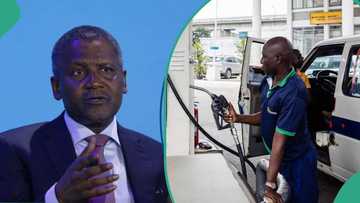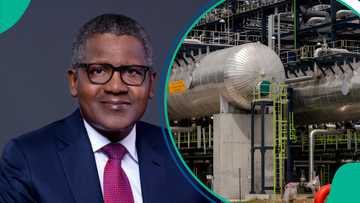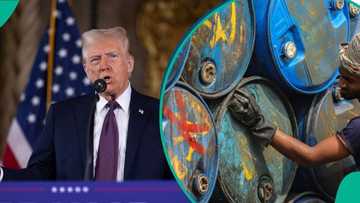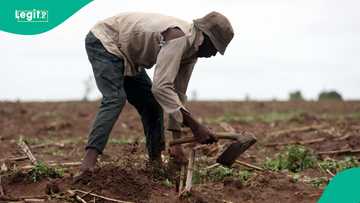Dangote Sends Warning to Petrol Importers, Speaks on Damages of Dirty Fuel
Aliko Dangote warned that Africa loses an estimated $90 billion annually due to the importation of inferior and environmentally damaging fuels, which could be refined locally
He highlighted that Africa produces plenty of crude oil but imports over 120 million tonnes of refined petroleum products yearly because of limited refining capacity
Dangote also reflected on the challenges of building the Dangote Refinery, emphasising the scale of the project, including land clearing, infrastructure, and others
Legit.ng journalist Zainab Iwayemi has 5-year-experience covering the Economy, Technology, and Capital Market.
Aliko Dangote has warned that the importation of inferior, environmentally damaging fuels is causing Africa to lose an estimated $90 billion a year.
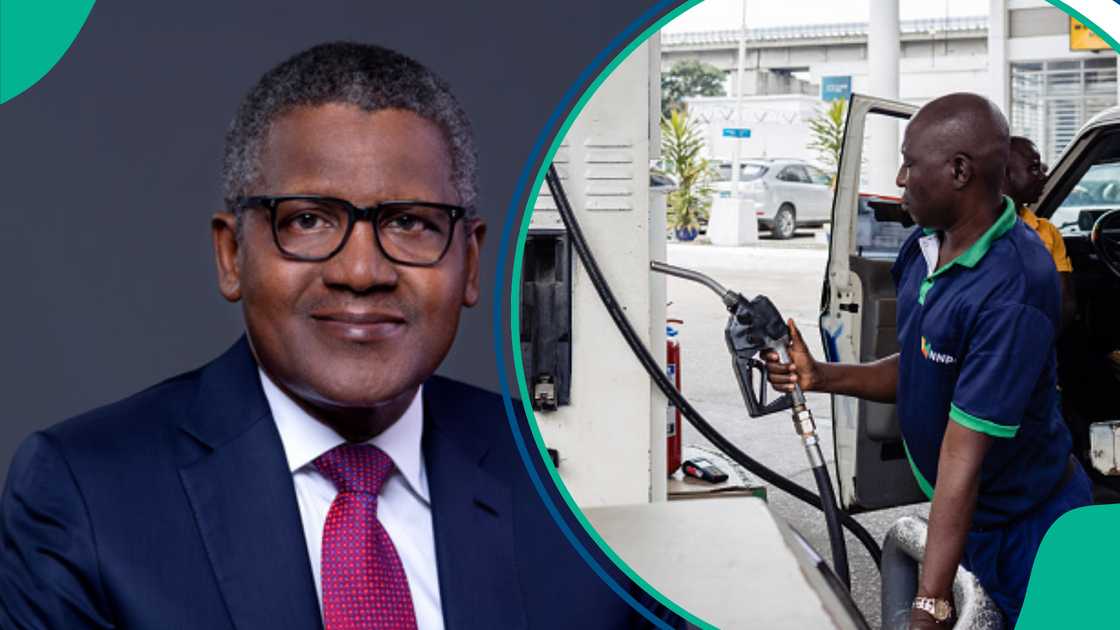
Source: Getty Images
Speaking about the operations of the Dangote Refinery, the billionaire businessman and chairman of the Dangote Group revealed that many imports are blended to inferior levels that would not be allowed in North America or Europe, yet are dumped in Nigeria.
He went on to say that in order to reach its refining goals, his facility now imports 9–10 million barrels of crude oil per month from the US and other foreign sources.
Speaking at the Nigerian Midstream and Downstream Petroleum Regulatory Authority (NMDPRA) and S&P Global Commodity Insights-hosted West African Refined Fuel Conference in Abuja, Dangote disclosed that Africa imports more than 120 million tonnes of refined petroleum products annually at an approximate cost of $90 billion because of the continent's limited domestic refining capacity.
He acknowledged that the Nigerian National Petroleum Company Limited (NNPC) imports between 9 and 10 million barrels of crude from the United States and other nations, but also thanked the management for providing some cargoes of Nigerian crude from the beginning of production to this day.
He said: “As we speak today, we buy 9 – 10 million barrels of crude monthly from the US and other countries. I must thank NNPC for making some cargoes of Nigerian crude available to us from the start of production to date.”
Dangote added that although Africa produces around 7 million barrels of crude oil every day, only about 40% of the 4.3 million barrels of refined products it consumes each day are refined domestically. Europe and Asia, on the other hand, refine more than 95% of their use.
“So, while we produce plenty of crude, we still import over 120 million tonnes of refined petroleum products each year, effectively exporting jobs and importing poverty into our continent. That’s a $90 billion market opportunity being captured by regions with surplus refining capacity. To put this in perspective, only about 15% of African countries have a GDP greater than $90 billion. We are effectively handing over an entire continent’s economic potential to others—year after year,” he said.
Nigeria is capable
Dangote emphasised that trade must be based on economic efficiency and competitive advantage, not at the price of quality or safety standards, even as he reiterated his faith in the strength of free markets and international cooperation.
He stressed that, “it defies logic and economic sense for Africa to be exporting raw crude only to re-import refined products—products we are more than capable of producing ourselves, closer to both source and consumption.”
As Dangote reflected on constructing the largest single-train refinery in the world, he also outlined a number of difficulties encountered, such as commercial, technological, and contextual barriers that are specific to Africa.
Refineries like the Dangote Petroleum Refinery are among the most logistically complicated and capital-intensive industrial facilities ever built, according to Africa's richest man.
He claimed that the Dangote refinery project needed to clear 2,735 hectares of land, 70% of which was swampy. In order to stabilise the site and raise it by 1.5 meters, 65 million cubic meters of sand had to be pumped, along with more than 250,000 foundation piles and millions of meters of electrical, plumbing, and cabling.
“At peak, we had over 67,000 people on-site, of which 50,000 are Nigerians, coordinating around the clock across hundreds of disciplines and nationalities. Then, of course, came the COVID-19 pandemic which set us back two years and brought new levels of complexity, disruption, and risk. But we persevered,” he noted.
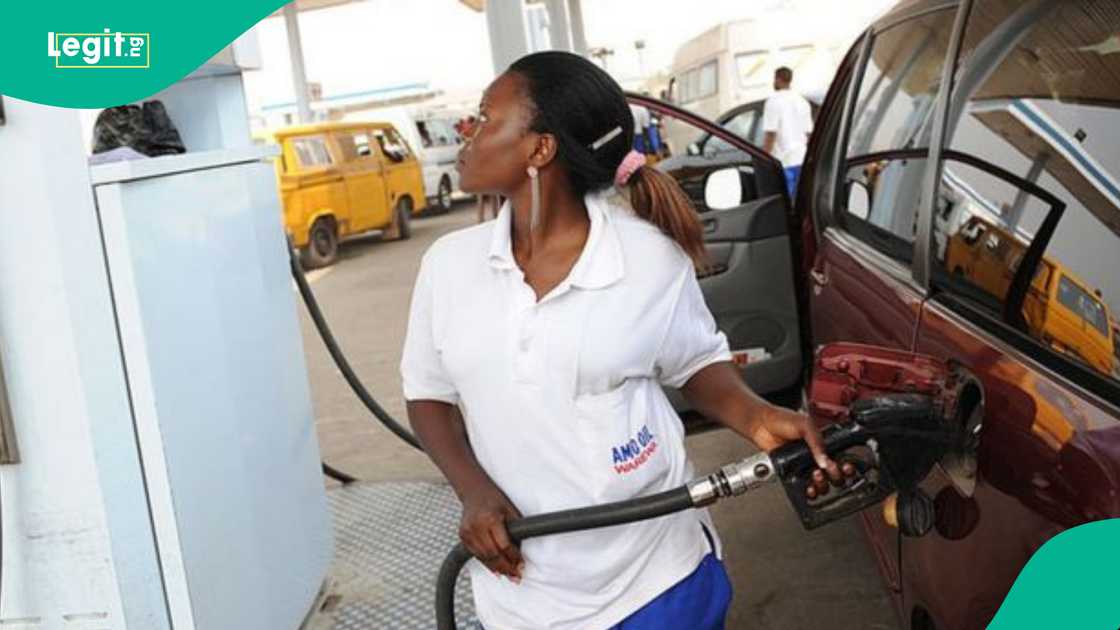
Source: Getty Images
Due to the inability of Nigerian ports to accommodate the size and quantity of equipment required for the refinery, a separate harbour had to be constructed. This comprised 330 cranes, more than 2,500 pieces of heavy machinery, and even the construction of the biggest granite quarry in the world, which can produce 10 million tonnes of granite annually.
“In short, we didn’t just build a refinery—we built an entire industrial ecosystem from scratch,” he said.
Petrol imports crash
Legit.ng reported that Nigerian oil marketers’ imports of Premium Motor Spirit (PMS), also known as gasoline, fell to a record low in June, driven primarily by a surge in production from the 650,000-barrel-per-day Dangote Petroleum Refinery, according to new data.
According to an Argus article citing Kpler tracking data on Tuesday, July 8, 2025, the Dangote refinery's increasing output significantly decreased demand for the product from Norway, the United Kingdom, and European Union nations, which are traditional exporters of refined gasoline to Nigeria.
June was the lowest volume of gasoline exports from Europe to Nigeria since tracking started, according to Kpler statistics, underscoring the growing influence of domestic refining on the fuel import profile of the nation.
Proofreading by James Ojo, copy editor at Legit.ng.
Source: Legit.ng


